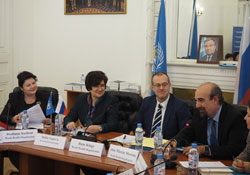WHO promotes intersectoral collaboration for better health in CIS countries

WHO
On 10 October 2017, the WHO Country Office in the Russian Federation hosted a roundtable discussion on intersectoral collaboration for improved public health outcomes in countries of the Commonwealth of Independent States (CIS). The focus was on implementing essential public health operations (EPHOs) towards the achievement of the Sustainable Development Goals (SDGs).
Dr Hans Kluge, Director of the Division of Health Systems and Public Health at WHO/Europe, Dr Anna Cichowska Myrup, Programme Manager for Public Health Services in the Division of Health Systems and Public Health, Dr Jose Martin-Moreno, WHO Senior Advisor, and the team of the WHO Country Office in the Russian Federation led by Dr Melita Vujnovic met with representatives from 9 CIS countries. Together they discussed the progress made in strengthening public health services.
In her welcome speech, Dr Vujnovic emphasized that health and intersectorality are essential components of the SDGs for all the countries. “The Russian Federation is committed to improving public health outcomes and actively promotes intersectoral collaboration, in particular in implementing the EPHOs,” she said.
The European Action Plan for Strengthening Public Health Capacities and Services (EAP-PHS) is a key implementation pillar of the European health policy framework Health 2020, and sets out the 10 EPHOs. These 2 strategy instruments place a strong emphasis on intersectoral approaches to improving public health outcomes. As such, they are fully in line with the 2030 Agenda for Sustainable Development and its SDGs.
The 2030 Agenda underscores the importance of public health services working across sectors, and of public health leaders – across all levels of society – acting as advocates for intersectoral collaboration. In this regard, the roundtable discussion was aimed at creating an opportunity to share experiences in undertaking EPHO self-assessments, and good practices in applying intersectoral approaches to achieve improved public health outcomes.
Many of the participating countries had already conducted EPHO self-assessments that allowed them to identify the stronger and weaker aspects of their national public health systems. Summing up relevant discussions, Dr Kluge’s stated that “although a number of important achievements in strengthening public health services have happened in the Region, and the EAP-PHS has proven a valuable tool to countries looking to strengthen their public health services, the potential of the EAP-PHS has remained largely unrealized”.
He noted in particular that “the gap between the stated level of political commitment and the actual means and resources being allocated to these reforms remains present”. This indicates that the evidence on the cost-effectiveness of public health interventions is not broadly known.
The following day, the team from WHO/Europe participated in the 1st All-Russian Forum on Public Health, opened by Dr Sergey Kraevoy, Deputy Minister of Health of the Russian Federation. This large-scale event brought together the leading national public health professionals and served as a key platform for elaborating priorities for the public health system in the country.
In his presentation, Dr Kluge highlighted that modern public health is interdisciplinary by nature and thus concerned with addressing the determinants of health across a population, including access to key health services. Echoing the vision of WHO and the EPHOs, many Forum speakers stressed the vital role of intersectoral collaboration and of a health workforce equipped with key public health competencies in the delivery of public health services.



